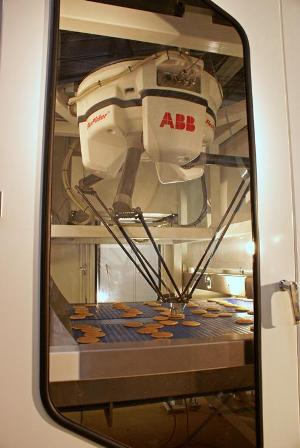
ABB has captured over 30% share of the UK market for industrial robots in the first three months of 2010, according to results available from the British Automation and Robot Association (BARA).
The leading market share continues from that achieved in 2009 when ABB took 36% across the entire year. ABB says that the figure is significant as it is not a result of any spike created through one major project. Within ABB, only one other country sold more robots in 2009 than 2008, an encouraging sign of the much publicised green shoots of recovery are showing in UK manufacturing, and that manufacturers are seeing the benefits of automation in building long term competitiveness.
If we take into account our automotive business this year then our market share jumps to 50%," says Nigel Platt, ABB's UK sales and marketing manager for robotics. "I believe that robotic sales in 2010 will continue going from strength-to-strength and I predict another year of significant growth." With the overall decline of the UK automotive industry, following the withdrawal of some key brands, and the slow investment, in the last five years, from the remaining manufacturers, ABB's growth is even more remarkable.
Platt attributes the success to three key strategic developments in the business: a focused channel partner network; investment in training; and the largest service organisation in the UK.
In the last five years ABB has created a channel partner network comprising independent companies focused on niche markets including machine tending, materials handling, and picking, packing and palletising applications. The channel partners comprise system integrators and a smaller number of OEM machine builders. Some 80% of these partner sales were to the food and beverage sector.
Backing the channel partner network is the largest, dedicated industrial robot training school in the UK, which has recently invested £100,000 in new robots for some of its 10 cells, along with classroom materials.
Further support is provided by the UK's largest network of field service engineers, with twice as many service engineers available to industry as ABB's nearest rivals. "The network provides true 24 hour, 365 day support to any part of the UK. It is this level of professionalism that is respected by the industry and accounts for most of our success in recent years."
Among sectors now being targeted for growth is the pharmaceutical industry, particularly the demand for packaging machinery. "We are making good progress here along with dedicated system integrators," says Platt.
Platt adds: "ABB's commitment to the UK manufacturing sector is unequivocal. And the robotics activity is set to play a pivotal role." This was confirmed recently when ABB restructured its divisional structure to embrace robotics within its Discrete Automation and Motion division. Until then, robotics was a standalone business activity.
"We now need to encourage UK business to embrace robotics and follow the lead of the food and beverage industry. The majority of what we are selling today is to this sector. It has realised that there are 10 good reasons for using robots and these include:
Drastically reduced operating costs
Consistently high product quality
Enhanced employee satisfaction
Increased production output rates
Increased product manufacturing flexibility
Enhanced competitiveness through greater efficiency
Improved workplace health and safety
Reduce the difficulty of recruiting skilled staff
Reduced capital costs (inventory, work in progress)
Space savings in high value manufacturing areas"